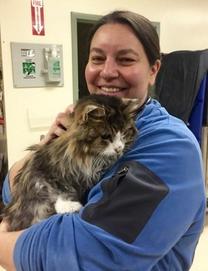
Dr. Leila McIntyre graduated from the University of Leipzig in Germany in 2003. She obtained her postgraduate degree in virology/prion diseases from the University of Leipzig in 2007 before moving to Alberta to join the veterinary virology lab at the University of Calgary as a postdoctoral fellow. After working in research for a few years, Dr. McIntyre decided to obtain her Certificate of Qualification so she could practice veterinary medicine in Canada. In order to gain some clinical experience, she joined the team at a 24 hour veterinary hospital in Calgary in 2010. This was the first time Dr. McIntyre became aware of the impact of declawing on her feline patients. While the hospital she worked at did not declaw cats, she saw the effects that the surgery had on some of the feline patients that were presented there: chronic pain (arthritis, paw and back pain), behavioural changes, cystitis etc. Dr. McIntyre was shocked when she learned that the declaw surgery was considered a routine procedure in many hospitals across Canada.
In 2013 Dr. McIntyre obtained her Certificate of Qualification. After moving to Nova Scotia, she worked in several small animal clinics until becoming an associate veterinarian at the Cobequid Animal Hospital in Lower Sackville in 2015. One of the owners of the hospital, Dr. Melissa Burgoyne, was one of the driving forces behind the ban of declawing in Nova Scotia (during her NSVMA presidency in 2017). Dr. McIntyre has never declawed a cat, and she has always been very outspoken about her feelings in regards to the procedure, especially after seeing the effects of this surgery on her feline patients, the hospital staff, pet owners and herself on a physical as well as on an emotional level. Dr. McIntyre is trying to raise awareness amongst pet owners and veterinary workers on the long term consequences of declawing. She is very proud and happy that the Nova Scotia Veterinary Medical Association banned declawing, and she hopes that other provinces and states will follow suit soon.

